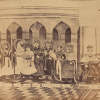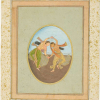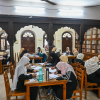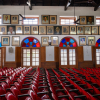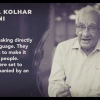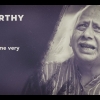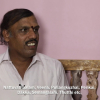Neerja Dasani: So we can start with your association with Kalakshetra, when you joined as a young girl and seeing dance history in front of your eyes, working with Rukmini Devi in her first dance drama production, all those experiences…if you can just touch upon some of that.
Jaya Teacher: Well, it was a long time back indeed. That was a time when even my grandmother and others, they didn’t approve of my taking to dancing. It just happened. My brother was the doctor at the Theosophical Society, doctor for Dr. Arundale and Rukmini Devi. So it just happened. Rukmini Devi said, why not? That was about the time when I was not well, I had jaundice or something. I was on a holiday perhaps, they said now you can join. But now I began to think I liked dancing probably. I loved to see Rukmini Devi’s programme at the time. Every convention, even if it is yesterday and today I want to go. [I was] highly fascinated by that and I thought, alright. After about a year I was given a chance as to what I want to do because all the others are academicians in my house. So I said I’ll pursue my dancing and also this. This is how my journey started.
I was in the first year and Rukmini Devi had her first production, (G.) Sundari must have told you about all those things.
ND: No, very little. She spoke more on the administration and the fund collecting. She said you’ll talk about dance.
JT: She must have said about Periya Sharada also.
ND: Little bit.
JT: What little bit…a lot of it. She should. And I hardly know much of dancing at that point of time, probably simple sentences as such. That’s all it was. All of a sudden she said, ‘The one who takes part as a gypsy should sing.’ I remember it was Deepavali, I was coming from the stairs singing something. Rukmini Devi was walking that way. That was a film song. I got so frightened. All these things you can remove, I’m just telling you the story of that. She sent word for me and she said, ‘I’m going away, you’re going to learn this.’ Out of sheer fright I said okay. I didn’t know what I was saying.
So that is how it was. But she’s a genius and whatever that I know she made something so wonderful with that, to bring out the best out of me at that. The only thing that I knew was to dance with her and we were all very small, twelve, thirteen, something like that. And sometimes when she’s dancing I’ll get lost in her dance and she’ll (makes a sound), then I wake up and worry. Like that. That’s how it was, just went on like that, then it continued with ‘Kumara Sambhavam’ and so many other things. And it is her intuition, more than anything else and we have also learnt things, not sitting in a class or anything, very casual. When we have the lights rehearsal she’ll say just to go and tell that man, put only the crimson and if you put the yellow and this, then this will become grey, the blue will become grey, tell him that. Ask him to put the rose…for this, for that, for this, for that, that’s how we learnt about the lighting, the costumes and the curtains. She would give, offer ideas, and a very tough master..
We had ‘Kumara Sambhavam’ and in those days you see not the readymade costumes or any such thing. We had to do it, all those things. Day after, or two days later, was the programme and she would see the sculpture and say, everybody used to laugh here and I’m doing it at home (not clear). See the line, we have to go this way and there must be this (demonstrates), all that she would say. On the light rehearsal she said, ‘I can’t approve of it. It’s not…now you can’t get it.’ That is the time that I learnt the word ‘magenta’. I know Ajanta, but not magenta! And even the shopkeeper did not know what is magenta. All over Bombay, we were in Bombay, she said, you go there and get it. (Speaks in Tamil), don’t know, even they said. Day after tomorrow…where to go? How to do? She said, ‘I couldn’t care less, I can’t have ugly things on like this. So we all went, take through 24 hours…doing it all with hands, mind you. And you go there after getting dressed up, and you have to go and show it to her. You turn this way, that way, that way, this way. ‘What is this? I said the line should come.’ (Gestures) Can’t show your expressions at all. And her costumes were stitched but it needed some more. And you stitch them, at the end of it if you put the knot that way, she’ll see only that. ‘Haven’t you got eyes?’ It has to be redone and I have to be on the stage. The first bell goes, do it, run to the stage without showing anything and start with that. But it’s good, absolute perfection, absolutely perfect.
Even in the typing when that comes, when one letter is lighter or going up, she can’t stand it. My god! That’s why we were trained that way in everything. Even in a grouping, she’ll say, ‘Three, four, five—that’s how we learnt. You can’t stand in one line like that. And why don’t you people react?’ Side acting. So everybody should be absolutely alert at that time. And she is one, she will have four people doing their script and all those things, one in green, one in red and that is this, this, this. And she goes in the car she’ll be just going with that. And then she’ll come. She’ll ask us to come at eight-thirty; she will come at eight o’clock and sit, ‘Why have you come late?’
And there are two instances that I can say are intuition. We were doing ‘Gita Govindam’, and you know there’s a person, a great Sanskrit scholar and lawyer, a very famous one, one Mr. Balasubramaniam. He said, ‘How erotic you know that, without touching that and she has done it so beautifully absolutely’. And she did it. After five years, Saraswathi Mahal Library at Thanjavur, they published it, exactly the same hastas they had. Amazing! And in the same way, we were doing ‘Meenakshi Vijayam’, when it gets stuck she would walk out. And she was just sitting and then ‘You know what I want now? Shiva should come from the Himalayas and he must dance and then get dressed for his wedding.’ And Sharada, Periya Sharada is the one who always gives all those things, ‘There is no such thing in the story.’ ‘I couldn’t care less. I want to have it that way. That is how it would be nice. I can’t do anything more.’ She just walked out. Four days after that Sharada had gone to the Tamil library for something else, exactly the same thing was there. She came and read it and said it is there, she said you know it is there.
Later in her life she was a nominated member and she was so many other things. In spite of it this was her main thing. There was a point of time, the Government of India wanted to have this as a national institution, mind you I don’t know how…I mean this is authentic but there are so many things which may not be true. She said no. And when the government wanted to take it she said—now of course after her time it has been taken—but she said this is my baby and you’ll come and tell me how to handle my baby. And you’ll say this is the rule, the red tapeism and this and that. I don’t want it. We cannot have it.
The other thing was, which of course I was present in this instance what I am saying now. After our festival, Indira Gandhi wanted to have a programme for Varun Gandhi and who’s this now, Rahul. They were both small at that time, mind you, when I was dancing, it was some twenty, thirty years back. She said no. ‘She’s the Prime Minister!’ ‘So what? I’m the empress of my fort. No. Tell them, whoever comes to you, all my children work for our December festival, we start working through October. Otherwise you cannot get that perfection and so and so.’ But the children had worked hard. And Mr. Sankara Menon, who was the Deputy said, ‘Ma, if she comes all our, we’ll get many benefits, the roads will be better and this will be better.’ ‘I will go driving only by this road, it’s alright I’ll continue that way.’ Ultimately he convinced us. We all went to her and said, ‘We will dance.’ You can’t bluff to her at all, she will just cross-question you and you have to blurt out the truth. ‘Have you been goaded by Sankara Menon?’ ‘No, no, no, only sir said, we said yes.’ ‘You won’t have a compensatory holiday.’ ‘No, no, no.’ We did it. And mind you she’d come by the flight, she didn’t go to the Raj Bhavan, she went around to the opposite side, watched the programme and went by that way. No one knew she was coming and she was going.
A great quality in her is to have both geniuses to be appointed in Kalakshetra. In the sense you see, those are the old traditional teachers. I always tell them Rukmini Devi appointed people not super-annuated, super-super-annuated. You see the ‘Ramanayam’ was composed, he (Mysore Vasudevachar) was 92. He has made an excellent, excellent, even today, he has perpetuated the whole thing. The other man, it was eight generations of Veena players, Veena Sambasiva Aiyar and he was one who could play like this (demonstrates vertical posture) also. And such geniuses. And this first Kuravanji music composer (Veena Krishnamachariar), below the waist he was disabled. She made everything so flat for him, so he can go like this and he made excellent music for that.
So this is all the things she said to the government, ‘You will say your rules is after 60 you cannot do this-that, that-this and I don’t want it. It’s my baby, I don’t want it.’ And Sundari must have told you, she has been offered the Presidentship of India. Morarji Desai offered that, she said no. She declined it. She said if I go there then there is a sort of a protocol to come and see my baby, I can’t. See anybody can be, any scholar, anybody, any politician can be a President—not everybody can be an artist. So she said no, everybody said ‘You are a fool’. She said, ‘I don’t mind being called as a fool because these are my children and I have a purpose to promote the art, in a sense. And so she said no to the Presidentship of India and Morarji Desai was really upset about it…and she said no. And also you see the thing is she also had a lot of problems when she started. A lot of books are there, you might have read about it and you see. All these people wrote a memorandum to the Viceroy to say this-that-this-that. Those were the very same people who came and said, ‘Rukmini, I stand by you.’
And Kalakshetra or Rukmini Devi, in a financial situation, all the time they were relying to happen and after all it was only a matter of 75 rupees to be paid to the staff members. And we are the people you know who have been from the doctor’s house, from the teacher’s house, we are the students and we don’t really need anything, it’s more of a homely effort and that was all that is. But they have been very helpful. Even when she was in the Parliament…there’s one thing, when she sets her mind, that will be done, no matter who that is. As I told, if Indira Gandhi is sitting, Prime Minister or Empress, my foot.
The biggest joke is person with a…I mean, she used to lose her temper. If you don’t do and she imagines, it has to be done. But the next minute she would forget what she said, it’s only her artistic thing. She used to come to the exams, examination and I had to have…I was the co-examiner, I mean whatever, assistant. The teacher’s report, last year’s report, this year’s, I have to get all those things with all the paraphernalia. And she will just see, ‘That one in the corner, where is she from? What’s her background?’ She’ll always say, ‘You know everyone’s horoscope, so you can tell me.’
I am friendly with all the students, even if they are first year because you see one thing, the children are coming from different States; they don’t know the language at all, even if I speak in Tamil or English, everything’s the same. Food is different, climate is different; they need somebody. So I used to go to them and talk to them; that may the reason for that [V.R.] Devika to say I’m ‘teacher’s teacher’ because it’s not only my students. I’ll go to the hostel, ‘Aren’t you well, my child? I’ll ask the doctor to come and attend on you’ and do it. So the next day, if they don’t come for two days, I’ll say, ‘Did I not miss you, my child for two days?’, ‘No teacher I was not well.’ And another thing I have told my children, ‘Tell me the truth. Even if you’re bunking a class I’ll support you.’ This is the thing.
And…she [Rukmini Devi] will, after the exam, [she’ll ask] ‘What is to be done with that exam?’ So I said, ‘We’ll say we have failed her’, ‘Ae, no, how shocking it should be for a parent to see that proper report? We’ll say, she’s detained for not much of duration. The third thing, she remains in the same class because if you read the fourth sentence the impact will not be that [bad]’ (laughs). Then she’ll say, ‘It’s sad, you know. Have somebody to teach her for special classes. You examine her in October…paavam [Tamil: poor child, can also mean naïve/innocent], we’ll do something.’ I have to do that, Athai, she feels and if I did it. I said ‘No. I can take the responsibility of teaching her alright, you come back again and see it.’ ‘You can’t do that?’, ‘I can but…’, ‘You can’t do it?’, ‘No, Athai.’ ‘Who’s cared in the past, to come to the fourth year?’ I have to keep quiet.
And for Rukmini Devi, for anything that she has, she will come home. She is very stickler about the class, finish my class and come. This is the hall she would be sitting (gestures to the front), there’s another entrance (gestures to the side), I would go by that. She will say, ‘Why have you left the class and come?’, ‘No, it is time. I have come.’ And she would never, never…that is why all our rehearsals were only after the class hours. The students should not suffer at any cost.
And the most important thing I have been telling all my students, it’s easy to say, she didn’t get it. What have you done to help her to get it? That’s what she always says, ‘What have you done to help her to get it?’ It’s most wonderful. That’s what I said, I tell my students. There’s one more thing. Dr. Arundale used to say, ‘If you want to teach maths to Rama, which most of the children won’t like, you have to win the heart first. Then it is easy to teach for you and for him to learn. Don’t go with the bitter pills, win the heart.’ That of course, I tried to do only that, as I told you mine is only one-fourth, they were called they don’t want to let me down and I get the undue [praise]…that’s all
But I’m so happy, my children may be really, really crazy about me and see all of a sudden from London I had a call. ‘My dear, do you know the time? It’s one-thirty in the night.’ ‘Teacher, that’s our lunch time, so I came out I thought I would just hear your voice and that is all.’ ‘Heard my million dollar voice? Is it enough? Bye’, I just push it. But the other one’s from Perth. ‘Teacher, you used to say that song is very good, I’ll sing it for you.’ I said, ‘Not over the telephone’ ‘Does that matter?’ I was in Australia at that point in time. My niece was asking, ‘Akka, who’s paying your telephone bill?’ She said, ‘Who cares? It’s my teacher.’ Such wonderful, wonderful children that I have. I mean even though they were not trained under me but because I go out of the way to say, ‘My dear are you alright? Do you need anything?’, so the relationship is so wonderful.
Now I must say the present generation is quite intelligent and they are most…what do they call that…some techie-savvy or something like that. And everybody says everything and they say they can learn everything from the internet. And some girl for an interview, for the Government of India scholarship and all those things, ‘Where did you learn this?’, ‘I got it from the net madam.’ I said, ‘Next time you can do Puja for that and do Namskaram for the Guru.’ Internet is the Guru for them.
For us we didn’t have, we thought it was the one for us. We didn’t have anything else, no distraction whatsoever. If you study, you study like that. We had only teachers like giving their souls to us. So we were the best beneficiaries of that, I must say. And after my time, I mean my time probably I might be able to give about fifty per cent of that. Slowly it has got diluted and in the sense you see everybody wants to dance and they want to have the fast food-like diet and there is no depth in it.
They’re probably some of them are technically correct but there is something more, I can even quote Rukmini Devi again. There was a student from Sri Lanka. It took a lot of time for me because she learnt already some dancing, absolutely, totally, what can I say, different. The angles are different, you see you can chisel a thing with a road, but the other things to route are very difficult and then it is. I got her made right. Examination, she got a Second Class and we always have a programme to determine whether she has a stage presence and all that, presence of mind and all those things. And when I had to do the Diploma for them, I have to supervise the whole thing as well. So it said…we have you know our Diploma is with a palm leaf, written on this and just a silver cap on that. And there’s a paper one also, later on it came.
It was only Baroda University which was teaching, as in the University level. Now you have got so many other things, Bombay University and SIBT (SNDT) or something in Bombay and so many other things. And now it is so ridiculous, correspondence course in dance! And this came again, I’m quoting Rukmini Devi. This came, my nephew was doing something like that interview and she was asking, ‘Can you teach dance by post?’ And then she said, ‘Can you do your surgery…’, he was a doctor, ‘…by post?’ Exactly the same way, that’s all it was.
Now in my opinion reading anybody can do. You don’t need that, but it’s always better to explain what it is, that will be much easier for them to follow when you don’t know anything at all. There were so many books, there were so any CDs. The other day I saw, what, ‘A to Z in Dance’. I said, ‘There is no Z there’. I said, ‘What is it about?’ You know ‘thaya-thayi’ and this and that and this and that. And how many people, so many people, not one, so many, so many of them. How many of them are authentic? I said, ‘Look, I’m not going to claim that you are authentic, the other person is not authentic.’ ‘The Kalakshetra always feels they are the ones.’ If you think we are the one, okay, we have no objection to it. But we have our way of doing things, that’s all there is. We never claimed this or that, whatever that was beautiful that has been done. And Rukmini Devi learnt from Meenakshi Sundaram Pillai, she asked his permission, if it could be done this way it could be better.
(Professor N.S. Jayalakshmi, a former instructor at Kalakshetra, is a parent-figure for the institution and for her students spread across the globe.)

